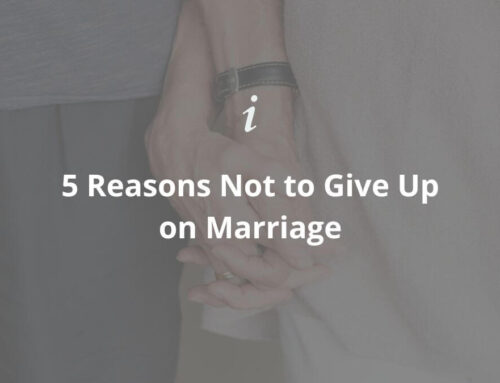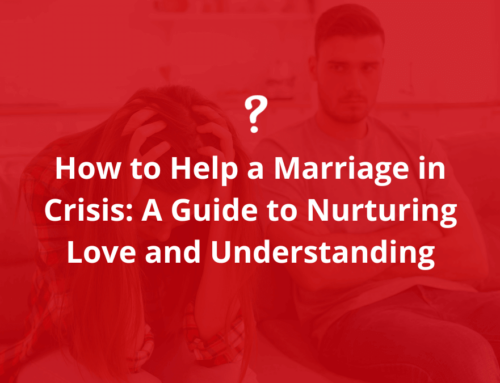You may or may not have heard of something called the four horsemen of the apocalypse. Now, if that sounds terrifying, that’s because it is. Researcher John Gottman found that people do these things when they fight, which he calls the four horsemen of the apocalypse. What he found was, if any of these four behaviors show up when a couple disagrees with each other, their chances of divorce are astronomical. And, if a couple would stop doing these four things when they disagree, then their chance of divorce decreases by 85%. That is crazy, and definitely something all of us should know because it matters for our relationships. Now, onto the four behaviors. I will tell you what they are in just a minute, and we’re specifically going to be focusing on one of them today: stonewalling in a relationship.
My name is Kimberly Holmes. I’m the CEO of Marriage Helper. I also have my master’s in psychology, and I am working on my Ph.D. in psychology. We’re going to talk about these behaviors today. I know them from the clinical perspective and having experienced them in my own marriage. I can tell you that when these four things, any of them, are present in an argument with my husband, it never goes well. So I’m going to share with you what those things are and how we can overcome them to become better in our disagreements.
I also want to tell you that I will share how you can get a free resource at the end of this article. It’s a course on how to get your spouse to open up and talk to you; how to get your spouse back in your life, back in your conversations. If these behaviors, these four horsemen of the apocalypse, have been ruining your relationship, then this course is for you. I’m going to tell you how to get that at the end of this article.
But first, the four behaviors, the four horsemen of the apocalypse, if you will, are as follows. There is criticism, contempt, defensiveness, and stonewalling. The one that we are going to be focusing on today is stonewalling.
Stonewalling In A Relationship
I talked with a friend recently who told me about a disagreement that he and his wife were getting into about finances. The debate was that one wanted to put their finances towards one thing, and the other wanted to put finances towards something else; a very common situation that marriages experience. There’s always going to be some disagreement or difference in opinion of where finances should go. Pretty normal.
However, in that disagreement, if one person is criticizing the other person saying, “How could you want to do that? Why would you want to do that?” That is where the criticism comes in and makes the conversation or disagreement hurtful, making it painful and negative towards the relationship. And typically, when that happens, the person who tends to stonewall will shut down. And here’s what stonewalling in a relationship is.
Stonewalling is when one person, kind of like a box turtle, feels the need to go into their shell when arguments start, because they don’t want to deal with the conflict. It’s a way of self-protection. But the reason that it’s part of the four horsemen is that it’s a type of conflict behavior. The intention behind stonewalling in a relationship is very passive-aggressive. That is, I’m going to stop talking to you, shut you off, and shut you out because I don’t want to deal with you.
So the intention behind stonewalling in a relationship is: I’m just not going to speak anymore. And you can keep yelling, or you can keep trying to get me to speak. But my way of fighting back with you is not to say anything because I know that will piss you off. So, the reason stonewalling is negative for relationships and why it has such a detrimental effect is because you can never work through the issues if there’s one person who’s constantly going to retreat as a form of passive-aggressiveness. If there’s a person who is continuously going to withdraw, as a way of saying, “I’m just going to ignore you, and you can try and figure this out yourself”, you can never actually come back together and compromise.
How do I know if I am stonewalling in a relationship or if I am processing?
And the answer to that is they can look very similar. When a stonewaller starts to look inward and box themselves in, it’s their way of trying to process. But there’s also this: I’m going to protect myself, and I’m going to be passive-aggressive about it. I’m going to do what I need to do, and I don’t care if you’re angry at me right now. I don’t care about returning to the conversation because I don’t want to fight with you. So that is what stonewalling in a relationship is.
The way that you can overcome stonewalling is by asking for a pause in the conversation. If there is a person who is saying, am I stonewalling? Or am I processing? One thing you can begin doing is to say in the conversation, “I need to process this. So will you allow me two hours, four hours, 24 hours, and come back to this topic tomorrow? So I have time to process.”
The ideal situation here is that the other spouse responds and gives that time. However, many spouses don’t want to provide 2/4/24 hours because the fear is that you’re never going to come back to it. If someone has been stonewalling in a relationship and that has been their M.O. over the past several months or years, that will be a rational fear that the other spouse has. “How do I know you’re telling the truth? And you’re going to come back to this?” So the end of the bargain that the stonewaller has to agree to is coming back and finishing that conversation.
These are just some quick tips on how you can deal with stonewalling in a relationship. If you’re the stonewalling person, remember, there is a difference between stonewalling and needing to process. If you need to process, say so, then hold up to your end of the bargain by coming back to it later. But suppose you find yourself wanting to ignore the subject or completely shut down because it’s your way of trying to fight with the other person. You’re trying to get back at them and really piss them off in a way you know is going to push their buttons. In that case, that’s stonewalling, and it is not helpful for the longevity of your relationship. You have to be able to talk about things and work them out.
So, what do you do?
If you’re the stonewaller, you ask for the time to process and then to come back to it. If you’re the person being stonewalled, then realize that your spouse may be stonewalling you because they feel pushed. What you can do is make your marriage a safe place for conversation to happen and compromise to occur. You’ll find that if you are married to a person who needs more time to process, and you give them that time to process, you’ll come together to a much better conclusion and compromise than you would if you constantly tried to push the situation for an answer. It’s not always the best practice or best for our relationships to try and resolve everything right now. Sometimes we do need to sleep on it.
That doesn’t mean we have to go to bed angry, but that is the joy and the benefit of the person who needs the time to think. To say it, and to say it graciously. To say it in a respectful tone and ask for it without feeling attacked or attacking the other person. The bottom line is: stonewalling in a relationship is incredibly negative. Men tend to stonewall more than women; just shut them out to try and shut them up. That’s what happens.
People who are stonewalling in a relationship do it because they feel attacked. Watch how you are presenting yourself in fights. Watch how you are coming across in the arguments that you have, and try to be respectful. There is so much that goes into this, and that is why you need to get our free mini-course.
I was talking about it at the beginning of the video, and now I’m going to tell you how you can do it. If you join our course, be sure to dive into it. We will teach you what you can begin doing differently today to change that dynamic in your relationship. To stop the crazy, stop the fights, stop all the negative communication, and be able to start reconnecting with each other in a positive way and in a way where you want to be around each other. Wouldn’t that be nice?
We would love to help you. We would love to help you and your spouse learn how to talk to each other again and have a better relationship than ever before. That is why we exist at Marriage Helper. So, be sure to join the course, go through the material, get involved, and start doing things differently to stop the stonewalling in your relationship and start having better conversations.






